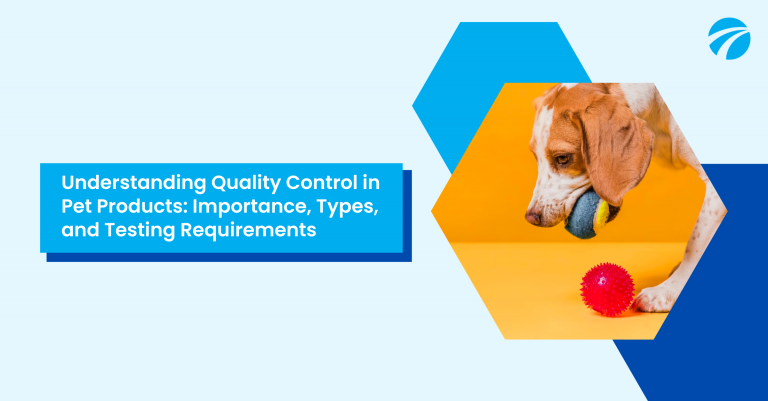Pets are more than just animals – they’re family. As a result, pet owners want to ensure their furry friends have access to safe and durable toys and accessories. However, ensuring that pet products meet quality standards is not always straightforward. With various types of pet products on the market and different tests required for each product, manufacturers and importers must implement comprehensive quality control measures. In this blog post, we’ll explore the types of pet products that need quality control, the different types of tests performed, and how Tetra Inspection can help.
Why Quality Control is Essential in the Pet Industry

The pet industry is a highly competitive market, and brands that fail to prioritize quality control risk facing legal, financial, and reputational consequences. Poor quality control can result in product recalls, which can be costly and damaging to brand reputation. In addition, pet owners are increasingly concerned about the safety and quality of the products they purchase for their pets. Therefore, it is crucial to ensure that pet products are safe, reliable, and meet the desired standards of quality.
Types of Pet Products that Require Quality Control
From chew toys to food bowls, pet products come in various forms. Each product has unique safety concerns that require quality control plan to mitigate. Here are some of the common types of pet products that need quality control:
Pet Toys Quality Control
Toys are one of the most popular pet products, but they can pose choking and toxicity hazards. Quality control measures for pet toys include bite, tear, and pull tests, as well as chemical and analytical tests for toxins.
Pet Food and Treats
Pet food and treats require quality control measures to ensure they are safe for consumption. Testing includes nutritional analysis, microbiological testing, and chemical analysis.
Collars and Leashes
Collars and leashes must be durable to withstand the wear and tear of everyday use. Quality control measures for collars and leashes include physical and mechanical tests such as pull and stretch tests.
Pet Bedding
The bedding must be comfortable and safe for pets to use. Quality control measures for pet bedding include testing for flammability and chemical emissions.
Different Types of Quality Control Tests for Pet Products
There are several types of tests that can be performed on pet products to ensure their quality and safety. These tests include:
Regulatory compliance tests for pet products
These tests assess whether the pet product meets the required safety standards and regulations in the destination market. For example, the ASTM F963-17, CPSIA, ISO 8124, EN 71, CCPSA, and China GB standards can be applied to pet toys.
Chemical and analytical tests
These tests evaluate the presence of harmful chemicals, toxins, heavy metals, and other substances that could pose a risk to pets or humans. Common examples of chemical and analytical tests include testing for formaldehyde release, plasticizers (phthalates), polycyclic aromatic hydrocarbons (PAH), and azo dyes.
Physical and mechanical tests
These tests assess the physical and mechanical properties of the pet product, including its durability, strength, and resilience. Tests such as sharp point/edge, small parts, bite/tear/pull, compression, and flex tests, pull tests are commonly used to evaluate pet toys.
Performance and durability tests
These tests evaluate the ability of the pet product to perform its intended function over time. For example, tests for moisture tolerance, stuffing analysis, and flammability can be conducted to ensure the product is safe and durable.
Pet Product Labeling requirements, including warnings:
These tests assess whether the labeling on the pet product is accurate, informative, and meets regulatory requirements. This includes checking for proper warnings regarding potential hazards, age restrictions, and proper usage instructions.
Performing these tests can help ensure the quality and safety of pet products, reduce the risk of recalls, and protect the brand reputation of manufacturers and retailers.
Tetra Inspection’s expertise in Pet Product Quality Control
Tetra Inspection is a third-party quality control company that specializes in pet products. Our team of highly experienced inspectors has years of experience in the pet quality control and can provide unbiased evaluation and specialized knowledge to help ensure that pet products are safe, reliable, and of high quality. Tetra Inspection offers a range of services, including factory audits, product inspections, pet products testing and inspections. We can help identify potential quality control issues before they become problems, and provide solutions to help improve product quality and safety.
In conclusion, as an importer or someone who outsources pet products from abroad, it is crucial to prioritize quality control to ensure that the products you bring in are safe, reliable, and of high quality. This involves understanding the types of pet products that require quality control, as well as the different types of tests that can be performed to ensure that these products meet the desired standards of quality, safety, and performance. By working with a trusted third-party quality control company like Tetra Inspection, you can ensure that your pet products meet these standards, and avoid potential legal, financial, and reputational consequences associated with poor quality control. Ultimately, prioritizing quality control in the pet industry benefits everyone involved, from manufacturers to importers to pet owners and their beloved pets.


